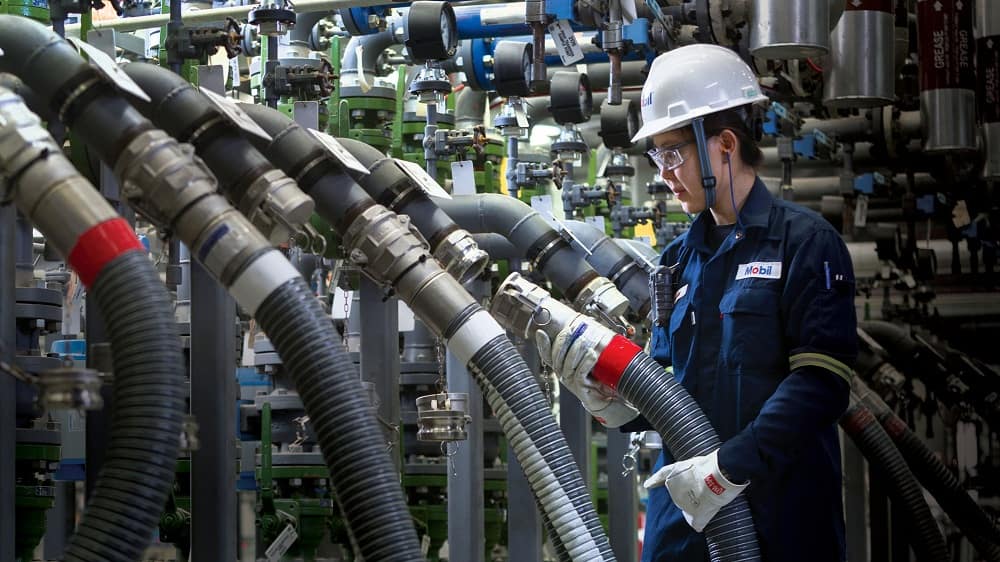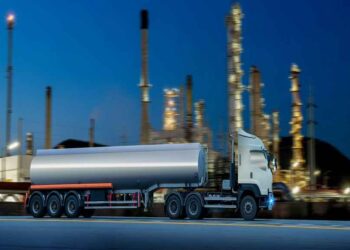Exxon Mobil Corporation announced estimated second quarter 2019 earnings of $3.1 billion, or $0.73 per share assuming dilution, compared with $4 billion a year earlier. Earnings included a favorable identified item of about $500 million, or $0.12 per share assuming dilution, reflecting the impact of a tax rate change in Alberta, Canada. Capital and exploration expenditures were $8.1 billion, up 22 percent from the prior year, reflecting key investments in the Permian Basin.
Oil-equivalent production was 3.9 million barrels per day, up 7 percent from the second quarter of 2018. Liquids production increased 8 percent driven by Permian Basin growth and reduced downtime, with limited impact from entitlement effects and divestments. Natural gas volumes increased 5 percent, excluding entitlement effects and divestments.
“We continue to make significant progress toward delivering our long-term growth plans,” said Darren W. Woods, ExxonMobil chairman and chief executive officer. “Our new U.S. Gulf Coast steam cracker is exceeding design capacity by 10 percent, less than a year after startup. Our upstream liquids production increased by 8 percent from last year, driven by growth in the Permian Basin, and we are preparing to startup the Liza Phase 1 development in Guyana, where the estimated recoverable resource increased to more than 6 billion oil-equivalent barrels.”
Second Quarter 2019 Business Highlights
Upstream
Average crude prices were stronger than first quarter, while natural gas prices declined with supply length and crude-linked LNG lag effects.
Liquids volumes increased with unconventional growth and ramp-up at Hebron, partly offset by the impacts of higher planned maintenance. Natural gas volumes were down from the first quarter due to weaker seasonal gas demand in Europe.
Permian unconventional development continued with production up over 20 percent from the first quarter and up nearly 90 percent from the second quarter of last year.
Downstream
Industry fuels margins, while remaining under pressure during the second quarter, improved from very low levels in the first quarter on stronger gasoline margins, mainly in the U.S.
Planned maintenance activity remained at a high level during the quarter, as the company successfully completed a significant turnaround at its Joliet, Illinois, refinery in the U.S. mid-continent region. Results were also impacted by unscheduled downtime at refineries in Baytown, Texas; Sarnia (Canada); and Yanbu (Saudi Arabia).
Chemical
Paraxylene margins weakened during the quarter with lengthening supply from recent industry capacity additions.
Results were impacted by a significant increase in turnaround activity during the second quarter.
Production at the new ethane steam cracker in Baytown, Texas, successfully increased to exceed design capacity by 10 percent.
Strengthening the Portfolio
ExxonMobil increased its estimated gross recoverable resource for the Stabroek block in Guyana from 5.5 billion to over 6 billion oil-equivalent barrels. During the quarter, the company made its 13th discovery on the block with the Yellowtail-1 well.
Mozambique Rovuma Venture S.p.A., an incorporated joint venture owned by ExxonMobil, Eni S.p.A. and China National Petroleum Corporation, announced that the government of Mozambique approved its development plan for the Rovuma LNG project. The project includes two liquefied natural gas trains with a combined annual capacity of more than 15 million metric tons. A final investment decision is expected later in 2019.
ExxonMobil subsidiary ExxonMobil Argentina Offshore Investments B.V. and an affiliate of Qatar Petroleum won three exploration blocks during Argentina’s first offshore bid round, adding approximately 2.6 million net acres to ExxonMobil’s holdings in the country.
ExxonMobil announced that it will increase its offshore exploration acreage in Namibia with the addition of approximately 7 million net acres following the signing of agreements with the government of Namibia and the National Petroleum Corporation of Namibia.
Investing for Growth
The company announced that it has funded the Liza Phase 2 development offshore Guyana after it received government and regulatory approvals. Phase 2 startup is expected in mid-2022, producing up to 220,000 barrels of oil per day, while Phase 1 remains on track for first oil by the first quarter of 2020. ExxonMobil estimates it will achieve gross production of over 750,000 barrels per day from the Stabroek Block by 2025.
ExxonMobil and SABIC announced the decision to proceed with the Gulf Coast Growth Ventures project to construct a new chemical facility in San Patricio County, Texas. The new facility will include an ethane steam cracker with a capacity of 1.8 million metric tons per year, two polyethylene units and a monoethylene glycol unit.
ExxonMobil made a final investment decision on a multi-billion dollar expansion of its integrated manufacturing complex in Singapore to convert fuel oil and other bottom-of-the-barrel crude products into higher-value lube basestocks and distillates. The expansion will add 20,000 barrels per day of
ExxonMobil Group II basestocks capacity and increase production of lower-sulfur fuels by 48,000 barrels per day.
ExxonMobil announced that it will proceed with a $2 billion expansion project at its Baytown, Texas, chemical plant. The expansion will add annual production of about 400,000 metric tons of VistamaxxTM performance polymers, and about 350,000 metric tons of linear alpha olefins.
The company reached a final investment decision to upgrade its Fawley refinery in the United Kingdom to increase production of ultra-low sulfur diesel by almost 45 percent, or 38,000 barrels per day, along with logistics improvements. The more than $1 billion investment includes a hydrotreater unit to remove sulfur from fuel, supported by a hydrogen plant which will improve the refinery’s overall energy efficiency.
The company is proceeding with an expansion project in Argentina’s Vaca Muerta basin. The project is expected to reach gross production of up to 55,000 oil-equivalent barrels per day within five years and will include 90 wells, a central production facility and export infrastructure.
ExxonMobil and its partners announced a project to increase gross production at Block 15 offshore Angola by approximately 40,000 barrels per day, while changes to the production sharing agreement will extend operations through 2032.
Advancing Innovative Technologies and Products
The company completed an expansion at its Singapore refinery to enhance EHCTM Group II basestocks production, with supply to customers expected in the third quarter of 2019. The expansion will enable customers to blend lubricants that satisfy more stringent specifications, lower emissions and improve fuel economy and low-temperature performance.
ExxonMobil announced that it will invest up to $100 million over 10 years to research and develop advanced lower-emissions technologies with the U.S. Department of Energy’s National Renewable Energy Laboratory and National Energy Technology Laboratory. The agreement, among the largest between the department’s laboratories and the private sector, will support research and collaboration into ways to bring biofuels and carbon capture and storage to commercial scale across the transportation, power generation and industrial sectors.



















































